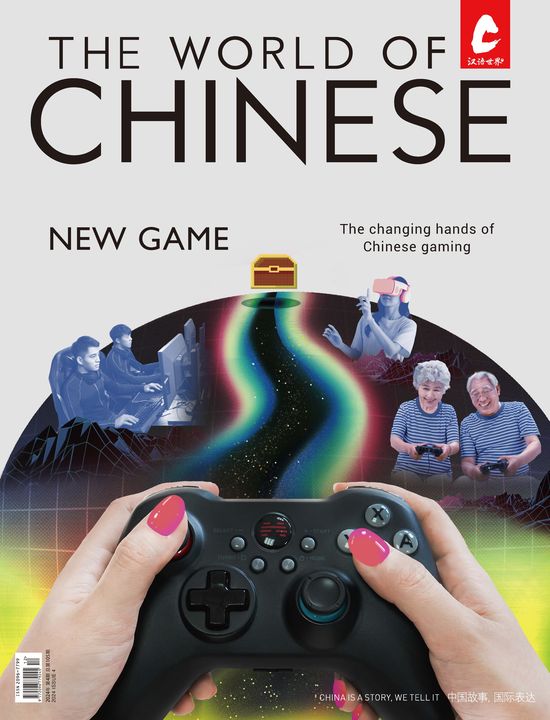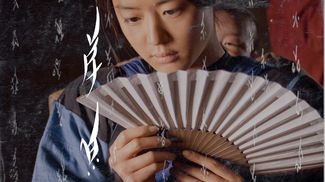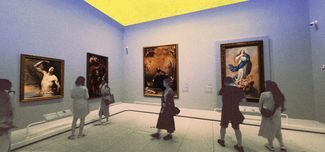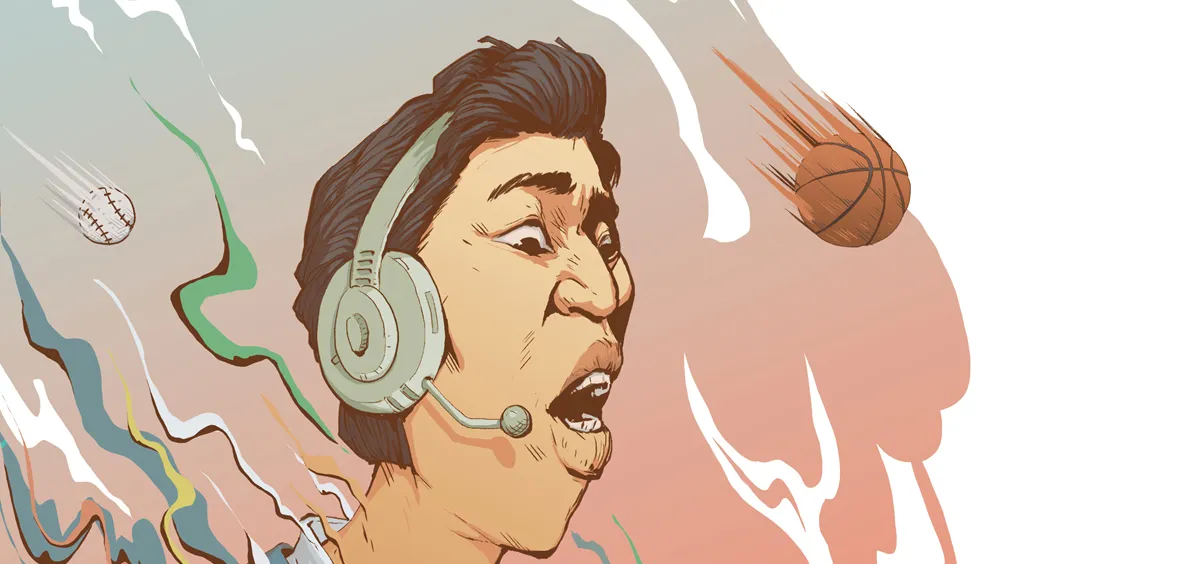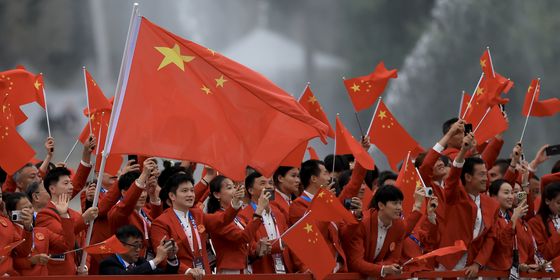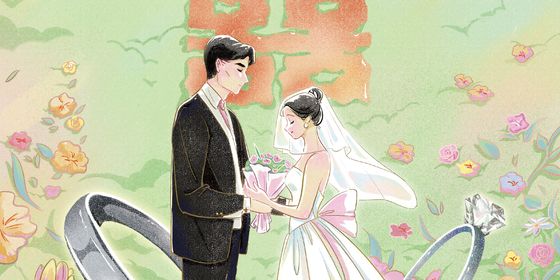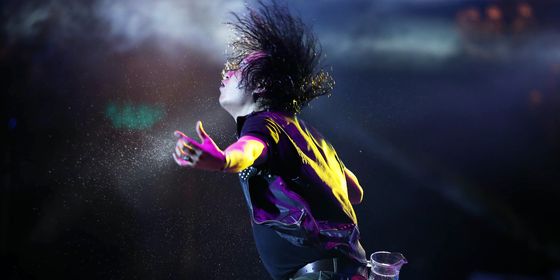A play-by-play of sports commentary in Chinese
“Develop sports activities and build up citizens’ health!” Chairman Mao said in 1952 with the establishment of the All-China Federation of Sports. Now, with over 200 Olympic medals and experience hosting a Summer Games under its belt, it’s clear that China’s enthusiasm toward sports continues to burn bright.
In attracting new audiences to sporting events, or increasing the enthusiasm of the old, sports commentators play an important role. Sports announcing in China started in February 1951, when journalist Zhang Zhi commentated on a basketball game between Shanghai and the Soviet Union on radio. The state-run China Central Television broadcast the nation’s first televised sports match with live commentary in 1958, and later set up a channel for sports broadcasts in the 1970s and 80s, sending sports journalists all over the world to interpret matches for audiences back home.
As sports broadcasting grew in popularity and professionalism, the style of commentary has evolved. Originally, only a single announcer provided analysis of the scores, but nowadays, multiple commentators may debate the performances of the athletes, give background information on the teams, and guide the audience through all the emotional ups and downs of each game.
Setting the mood
Before a match, it is important to elevate athletes’ morale, or 士气 (shìqì), and build up audiences’ expectations. At this time, sports commentators often say of the team, “Go for the win! All Chinese fans are on your side (为了胜利,全力以赴!所有中国球迷都是你们的后盾 Wèile shènglì, quánlì yǐ fù! Suǒyǒu Zhōngguó qiúmí dōushì nǐmen de hòudùn)!”
Audiences need to know what conditions this amazing line-up might be facing, which sports commentators will put under two categories. “External factors,” or 场外因素 (chǎngwài yīnsù), refer to elements such as the weather on match day, slippery conditions on the ground, substitutes playing, top athletes from an opposing team, or even road traffic that delays the team bus.
Rainy weather is an external factor that may affect the players’ ability to pass the ball on the turf.
Yǔtiān shīhuá de chǎngwài yīnsù huì yǐngxiǎng běnchǎng bǐsài duìyuánmen zài lǜyīnchǎng shàng de chuánqiú fāhuī.
雨天湿滑的场外因素会影响本场比赛队员们在绿茵场上的传球发挥。
The opposite, “internal factors,” or 场内因素 (chǎngnèi yīnsù), are the advantages or disadvantages intrinsic to the team. The most common are injuries to key players, though any major or minor change to the team in the past year, such as a head coach’s departure or tension between players, could rewrite the outcome of the match—or so commentators would have you believe:
The focus of the match is to see whether FC Barcelona can do the unexpected without Lionel Messi.
Běnchǎng bǐsài de yī dà kàndiǎn biàn shì kànkan Bāsàiluónàduì zài Méixī quēzhèn de qíngkuàng xià néngfǒu yǒu yìwài fāhuī.
本场比赛的一大看点便是看看巴塞罗那队在梅西缺阵的情况下能否有意外发挥。
Drumming up suspense
With players lined up on both sides of the court, it’s time for sports commentators to start creating an atmosphere of conflict and confrontation. War metaphors are common when describing rivalries in and out of the stadium. Two long-time rival players or teams might be called each other’s 死敌 (sǐdí), or “deadly enemy,” and their match “a clash of passion (激情的碰撞 jīqíng de pèngzhuàng).”
Welcome to the North London Derby, watched by tens of thousands around the world. The two teams are Arsenal and Tottenham Hotspur, who have been deadly enemies for a century, and will fight to defend their glory.
Huānyíng dàjiā shōukàn zhè chǎng wànzhòng zhǔmù de Běilúndūn Débǐ, duìzhèn shuāngfāng shì shìjì sǐdí Āsēnnà hé Tuōtènàmǔ Rècìduì, jiāozhàn shuāngfāng jiāng huì quánlì yǐ fù hànwèi zìjǐ de róngyù.
欢迎大家收看这场万众瞩目的北伦敦德比,对阵双方是世纪死敌阿森纳和托特纳姆热刺队, 交战双方将会全力以赴捍卫自己的荣誉。
However, it’s just as common for commentators to try to emphasize good sportsmanship as essential to sporting matches, or pepper their speeches with cliches:
On the pitch, it’s friendship first, competition second.
Zài yùndòngchǎng shàng, yǒuyì dì-yī, bǐsài dì-èr.
在运动场上,友谊第一,比赛第二。
This is even more important in international sports, as sports rivalries can be bound up with politics:
Before the mighty Brazilian men’s football team, the young men on the Chinese team should learn to be modest, study their opponents’ skills, and gain experience from the match.
Zài qiángdà de Bāxīduì miànqián, Zhōngguóduì de xiǎohuǒzimen xūyào xuéhuì fàngdī zītài, xuéxí biérén de chángchù, tōngguò bǐsài jīlěi jīngyàn.
在强大的巴西队面前,中国队的小伙子们需要学会放低姿态,学习别人的长处,通过比赛积累经验。
Fight on!
Sporting events are scenes of huge passion, with fans shouting and whistling to celebrate goals or scores. Sports commentators must try to maintain their enthusiasm, but cannot forget that their main job is to explicate the match for the masses. Commentators often phrase technical information about the game with humorous or expressive words to increase the audience’s enjoyment:
Penalty kick! Penalty kick! Penalty kick! And Fabio Grosso has done it! What an extraordinary left back for the Italians; he has inherited the glory of Italian football! Fabio Grosso alone represents the long and glorious tradition of Italian football. But at this moment, all of his teammates are on his side!
Diǎnqiú! Diǎnqiú! Diǎnqiú! Géluósuǒ lìgōng la! Wěidà de Yìdàlì zuǒhòuwèi, tā jìchéng le Yìdàlì de guāngróng chuántǒng! Géluósuǒ yí gè rén, tā dàibiǎo le Yìdàlì yōujiǔ de guāngróng chuántǒng! Zhè yí kè, tā bú shì yí gè rén zài zhàndòu!
点球!点球!点球!格罗索立功啦!伟大的意大利左后卫,他继承了意大利的光荣传统!格罗索一个人,他代表了意大利悠久的光荣传统!这一刻,他不是一个人在战斗!
Well-known announcers often have a style of commentary that they are famous for. Han Qiaosheng, a broadcaster who began working in 1978, is renowned for his bold style, often shouting his comments on a bad performance by one player or an excellent tackle by another. In the last decade, commentators like Duan Xuan and He Wei have been more focused on providing rational analysis, but are still remembered for some personality quirks—He Wei, in particular, has been crowned as “The Poet” by football fans for his use of metaphors:
If we say that the German football team was on the edge of a cliff before this game, now we can say they have fallen off, with only one hand clinging on to the cliff’s side.
Rúguǒ shuō zhè chǎng bǐsài zhīqián Déguóduì hái zài xuányá biān dehuà, nàme xiànzài Déguóduì yǐjīng diàoxià le xuányá, tāmen de yì zhī shǒu hái pān zài xuányá shàng.
如果说这场比赛之前德国队还在悬崖边的话,那么现在德国队已经掉下了悬崖,他们的一只手还攀在悬崖上。
Commentators must also walk a fine line between pandering to sports fanatics and avoiding bias. While fans may want passionate comments about key decisions on the pitch, like penalties or freekicks, neutral viewers may find it unprofessional if the commentator praises certain players too much.
Though the Chinese Women’s Volleyball Team won in the final, our rival Serbia also played well. Their strength and teamwork were excellent, and they probably just needed better luck.
Běnchǎng bǐsài Zhōngguó nǚpái suīrán yíng le, dàn duìshǒu Sài’ěrwéiyǎ de fāhuī yě zhídé chēngzàn, lìliàng pèihé dōu hěn búcuò, zhǐshì shāo qiàn yùnqi.
本场比赛中国女排虽然赢了,但对手塞尔维亚的发挥也值得称赞,力量配合都很不错,只是稍欠运气。
Parting Words
Sports commentators’ work isn’t over when the scores are out: they must summarize the match, revisit the highlights, and even express their outlooks toward the two sides.
As a result of this match, the Korean team has entered the group stage of the tournament, while the Chinese team is almost certainly out. We sincerely congratulate the advancement of the Korean team and hope the Chinese team will have better results in the future.
Běnchǎng bǐsài hòu, Hánguóduì yǐjīng tíqián chūxiàn, ér Zhōngguóduì chūxiàn jǐn cún lǐlùn shàng de kěnéng. Zài zhùhè Hánguóduì jìnjí de tóngshí, wǒmen yě xīwàng Zhōngguóduì zài wèilái néng yǒu gèng chūsè de fāhuī.
本场比赛后,韩国队已经提前出线,而中国队出线仅存理论上的可能。在祝贺韩国队晋级的同时,我们也希望中国队在未来能有更出色的发挥。
A good conclusion by a sports commentator can leave the audience with lingering memories. Though only one team or player can win, everyone deserves respect and encouragement on the field, as the CCTV Sports channel said of the loss of the Dutch football team to Argentina in the 2014 World Cup:
Orange is a splendid color that represents happiness. It’s also the warmest among the warm colors. Though the orange-clad Netherlands team couldn’t win the championship, their dreams live on. Remember, real men wear orange!
Chéngsè shì huānkuài huópō de guānghuī sècǎi, shì nuǎnsèxì zhōng zuì wēnnuǎn de yánsè, gěi rén yǐ zhuāngyán, zūnguì hé shénmì de gǎnjué. Jīntiān chéngyī jūntuán Hélánduì yījiù méi néng bǎituō “wúmiǎn” de guānghuán, búguò tāmen de mèngxiǎng hái zài jìxù. Jìzhù, zhēnzhèng de nánrén chuān chéngyī!
橙色是欢快活泼的光辉色彩,是暖色系中最温暖的颜色,给人以庄严、尊贵和神秘的感觉。今天橙衣军团荷兰队依旧没能摆脱“无冕”的光环,不过他们的梦想还在继续。记住,真正的男人穿橙衣!
Game On! is a story from our issue, “Rural Rising.” To read the entire issue, become a subscriber and receive the full magazine.
